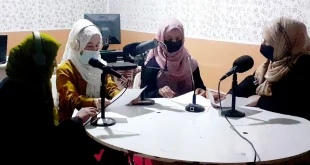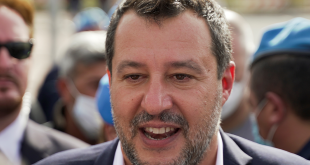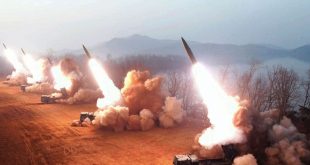
EXCLUSIVE: The snow was piling up and blizzard-like conditions were mounting as Anastasiya Koval, an American Ukrainian, crossed into the recently liberated city of Kharkiv in early December while on a humanitarian mission to deliver aid to the front lines.
“I didn’t realize how massive the city was. It was my first time there,” she described in an interview with Fox News Digital. “What really impacted me was when we finally crossed the bridge where the Russian soldiers had entered the city.”
“There’s these residential buildings, and you see the photos and you see the videos of these bombed residential buildings, but you can’t even imagine to the scale of what was destroyed there. Hundreds of thousands, and even millions of lives in one city that were just completely destroyed,” she continued. “You’re driving 15 minutes on this one area – every single building is bombed. Every single one.”

Residential buildings bombed in Kharkiv, December 2022.
(Anastasiya Koval with Evil Cannot Enter Heaven)
KHARKIV WON BY CIVILIANS-TURNED SOLDIER IN MAJOR VICTORY FOR UKRAINE IN WAR OF ‘GOOD AND EVIL’: TOP BRASS
Koval was able to enter the city under relative safety after Ukrainian forces ousted Russian troops in September and have continuously pushed them eastward, taking the fight to the center of Donetsk.
But strikes have increasingly begun to target Kharkiv as Russia has once again increased its aerial campaigns while its forces stall on the front lines – including earlier this month when Russia fired 76 missiles and drones in a single day at Ukraine’s second-largest city, taking out nine energy facilities and leaving more than half the city without power.
Despite significant battlefield successes in recent months for Ukraine, intense fighting continues in the small city of Bakhmut in eastern Donetsk, where trench warfare has become the norm.
Concerns like trench foot, frostbite and gangrene have become an everyday reality for soldiers dealing with the brutal conditions as winter sets in.
Koval, who was as close as 30 miles from Bakhmut, where some of the most brutal fighting is raging, said winter camouflage gear is at the top of soldiers’ wish lists.
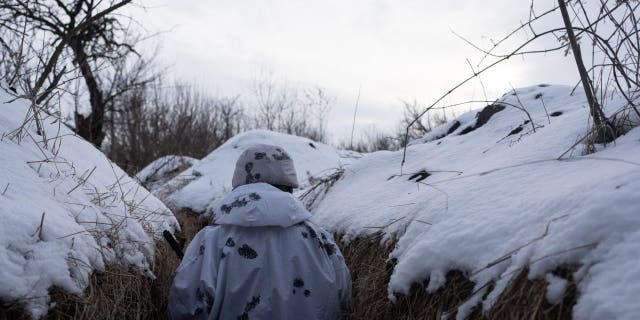
Ukrainian servicemen seen outside of Donetsk, Ukraine, on Jan. 31, 2022.
(Stringer/Anadolu Agency via Getty Images)
Snow has begun to carpet battlefields across Ukraine and the changing weather conditions not only mean soldiers need winter gear like coats, boots, thermal socks and sleeping bags, but they need cover from Russia’s latest weapon of choice – drones.
Drones are a relatively more affordable way for Moscow to wage war against Ukraine when compared to other types of missile systems and the Kremlin has ramped up its drone use in recent months across the country.
RUSSIA RELYING ON WWII GROUND TACTICS LEAVES VULNERABILITIES TO MODERN WARFARE: UK DEFENSE
But troops on the front lines need more than air defenses to counter these weapons systems, Koval said.
“They’re able to find them from sky,” she said, explaining how drones are used to locate soldier positions.
Koval described how camo covers, which act as windbreaker-like coverings and can fit in a backpack, are used to great effect to disguise soldiers and their equipment to their surroundings.
“It’s literally saving their lives, these camo covers – so they don’t get shot from the sky,” she said.
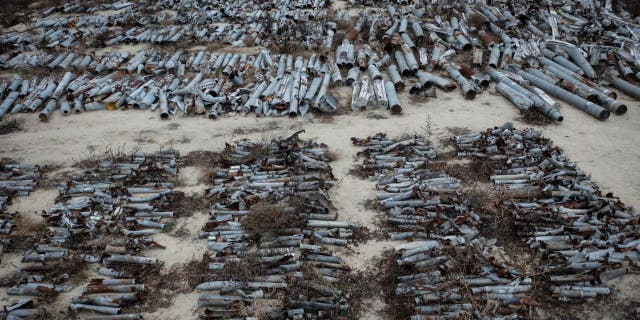
More than a thousand missiles and rockets fired by Russian forces and collected by prosecutors for use in war crimes investigations are seen at a depot on Dec. 18, 2022, in Kharkiv, Ukraine.
(Photo by Chris McGrath/Getty Images)
Koval has traveled to Ukraine on several occasions to help her father deliver aid to troops on the front lines.
Ihor Koval – who was born in Ukraine and served in the Soviet army prior to its dissolution in 1992 before moving to the U.S. – has been in Ukraine delivering donated items to the front lines since the war began.
The effort, which is organized under a nonprofit the Kovals set up, Evil Cannot Enter Heaven, is a family affair.
“My grandma and my grandma’s sister, they spent hours cleaning walnuts from the shells,” she said explaining how her family members still living in Ukraine have also done what they can to help support the troops, including drying out apples and giving them Coca-Cola. “The little things, you know.”
Koval said the support soldiers receive at home and from abroad has helped keep their spirits up.
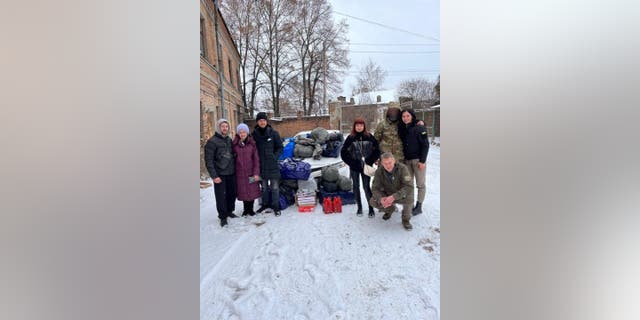
Volunteers Anastasiya and Ihor, with Evil Cannot Enter Heaven, delivering aid in Ukraine, December 2022.
(Anastasiya Koval with as Evil Cannot Enter Heaven)
CLICK HERE TO GET THE FOX NEWS APP
“They have this positive spirit, morale is high,” she said. “Primarily I believe because of all the people, not just the soldiers who are there defending, but you have so many regular citizens cooking meals for them, trying to supply anything and everything to them.
“It’s such a unified group effort,” she added.

 Latest Breaking News Online News Portal
Latest Breaking News Online News Portal


